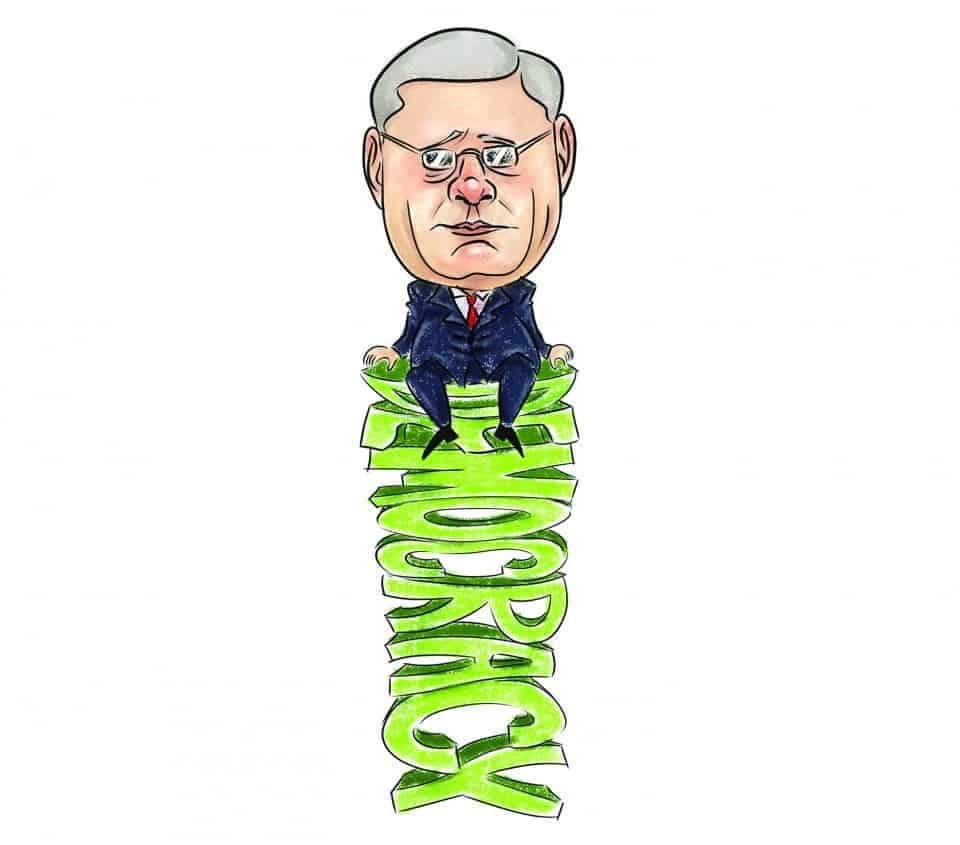[dropcap]Our[/dropcap] political system follows at least one basic rule: electoral procedure determines our values, policies, and national interests. It’s been this way since the Charter of Rights and Freedoms was drafted in 1982, and it’s the way most democracies operate.
Stephen Harper has had a fun ten years poking holes in this process. Just last month Chief Justice George Strathy — presiding over Ontario’s highest court since his appointment by Harper in 2013 — prohibited citizens living abroad for more than five years from choosing their own government. The move stops a 1.4 million-voter block from accessing the polls this October.
Those overseas citizens, perhaps gone to study, work, or reunite with family, no longer have a voice in their country’s democratic process. The 2014 ruling that gave them one has now been overturned, since Strathy insists the expat vote would “erode the social contract and undermine the legitimacy of the laws.” Those Canadians aren’t informed, he said, because they don’t live here.
Let’s forget for a minute that nobody else’s ballot is handed to them on the condition of political erudition. Put aside too, that there’s no test for policy awareness, and that voting is a constitutional right of birth no matter which borders one chooses to traverse, regardless of what amount in taxes one has paid. As Maclean’s pointed out, under 10,000 expats bothered to vote in the last election, a faction that hardly constitutes a threat to the tory reign. Strathy’s regressive ruling speaks volumes about how our government views its raison d’etre.
It does not matter that most expats don’t vote: it matters that now they legally can’t. Their rights of citizenship have been violated, in keeping with a pattern of disrespect that has become commonplace. What matters is the steady decline of participatory citizenship under a government that devises rules according not to documented legal rights, but to what is most advantageous come election season.
Slowly, but surely, we are becoming spectators of this strange sport rather than players within it; just look at C-51, C-24, a behind-closed-doors arrangement contriving the clauses within the Trans-Pacific Partnership, or the National Energy Board’s facade of a ‘public hearing’ process. Strathy’s ruling is merely one more example of this trend of eroding Canadian democracy. With the Harper government at the helm, we can only watch from the shore.
There’s a scene in Kazuo Ishiguro’s novel Remains of the Day: European aristocrats have gathered for a conference; they’re discussing post-Great War reparations against Germany. Mr. Lewis, the American ambassador, scoffs at these “decent, well-meaning” amateurs attempting diplomacy. “You here in Europe need professionals to run your affairs,” he declares to the dinner table. “If you don’t realize that soon you’re headed for disaster.”
For Mr. Lewis, the conference is a high-stakes game. He has no time to share the field with laypersons. Games, after all, are only meant to be won.
“I believe I have a good idea of what you mean by ‘professionalism,’” retorts the English lord. “It means ordering one’s priorities according to greed and advantage rather than a desire to see goodness and justice prevail in the world.”
Is our dear leader a psychopath? Probably. That photo op of him smothered in kittens didn’t fool anyone. But it might also be said, through some Machiavellian lens, that Harper played his cards professionally, just as Mr. Lewis advocates.
The challenge for us, as students, lies in finding a way to change the game by injecting ourselves into it. Amending Harper’s definition of Canadian politics means playing smart in this election. We can start by letting Harper know that his promise to defend against a Netflix tax won’t win over young voters. Perhaps then we can allude to the litany of constitutional encroachments that has steadily veiled government activity and silenced the voice of the people.
But if we want to win big, we must tell our party leaders that they need to define professionalism in terms not of power and victory, but respect and dignity.
Malone Mullin is a fifth-year student at St. Michael’s College studying philosophy.


